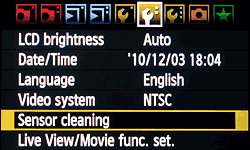BEST PRACTICES FOR KEEPING YOUR SENSOR CLEAN
The old saying “an ounce of prevention is worth a pound of cure” certainly applies to camera sensor dust. If you’re extra careful and minimize potentially contaminating events, then you’ll likely require far fewer sensor cleans over the lifetime of your camera.
- Lens Changes. Try to avoid unnecessarily changing out lenses, and only do so in environments with clean, still air (when possible). Also make sure that you change lenses quickly, and that the camera sensor is facing sideways or downwards during the lens change (to reduce the chance of settling dust). Leaving the rear element of your lens exposed and upright will not only collect dust on the lens, but this dust may later transfer to the sensor when the lens is mounted.
- Self-Cleaning Sensors. If you’re fortunate enough to have a newer digital SLR camera, many of these employ technologies that automatically clean the sensor every time the camera is turned on or off. This is surprisingly effective, but it cannot remove all types of dust, and these particles still accumulate within the camera body (thus increasing the risk of one of them landing on the sensor in the future). This feature therefore just decreases how often you’ll have to physically clean the sensor.
If the thought of cleaning the sensor makes you nervous, don’t worry — it should — a lot can go wrong if you aren’t careful. If you’d rather play it safe, here’s some alternatives:
Edit out the spots. The clone and healing brush tools can be very effective ways of removing dust spots. However, this only works if the spots appear in easy to remove regions of your photo, and if the dust problem remains minor; eventually you’ll still have to get the sensor cleaned. Editing and RAW development software sometimes also have dust map features which digitally edit dust spots in the same locations of each photo.
Have someone else clean the sensor. You can always send your camera to the manufacturer or a camera store so that it can be cleaned by a professional. If you plan on having a local store perform the cleaning, make sure to (i) verify up-front that they will insure your camera against any potential sensor damage, and (ii) check your camera by taking a test photo immediately after pick-up.
Source : https://www.cambridgeincolour.com

